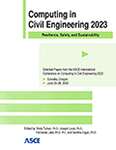Mixed Reality Promoting Circular Economy in Urban Water Systems
Publication: Computing in Civil Engineering 2023
ABSTRACT
By 2030, global water demand is expected to surpass supply by 40%, and only 81% of the global population will have access to clean drinking water, leaving 1.6 billion without water. In response to the global water crisis, the circular economy as a concept has been proposed and advocated over the past few decades, seeking to minimize waste, recover resources, and reduce consumption by sharing, reusing, and recycling water resources. However, there have been limitations in distributing the accumulated knowledge to the general public due to resource accessibility and interpretability of condensed information. To further promote the implementation of a circular economy, it is crucial to educate the public on its concepts and effects to encourage behavioral and policy changes. Consequently, this research seeks to bridge the gap by using cutting-edge technologies to increase public awareness. Mixed reality (MR) provides an immersive experience and integrates the physical and digital worlds as it allows users to interact with digital objects that are overlaid with the actual world, resulting in a more effective learning experience. This study presented a general framework for developing MR applications in educating the public on circular economy in urban water systems, which involves developing an MR application to be deployed on a mixed reality headset, namely Microsoft HoloLens2.
Get full access to this article
View all available purchase options and get full access to this chapter.
REFERENCES
Bajpai, M., S. S. Katoch, and N. K. Chaturvedi. 2019. “Comparative Study on Decentralized Treatment Technologies for Sewage and Graywater Reuse – A Review.” Water Sci. Technol., 80 (11). https://doi-org.ezproxy.lib.utexas.edu/10.2166/wst.2020.039.
Billinghurst, M., and A. Duenser. 2012. “Augmented Reality in the Classroom.” Computer, 45 (7): 56–63. https://doi.org/10.1109/MC.2012.111.
Blomsma, F., and G. Brennan. 2017. “The Emergence of Circular Economy: A New Framing Around Prolonging Resource Productivity.” J. Ind. Ecol., 21 (3): 603–614. https://doi.org/10.1111/jiec.12603.
Bouziotas, D., D. van Duuren, H.-J. van Alphen, J. Frijns, D. Nikolopoulos, and C. Makropoulos. 2019. “Towards Circular Water Neighborhoods: Simulation-Based Decision Support for Integrated Decentralized Urban Water Systems.” Water, 11 (6): 1227. Multidisciplinary Digital Publishing Institute. https://doi.org/10.3390/w11061227.
Chirisa, I., E. Bandauko, A. Matamanda, and G. Mandisvika. 2017. “Decentralized domestic wastewater systems in developing countries: the case study of Harare (Zimbabwe).” Appl. Water Sci., 7 (3): 1069–1078. https://doi.org/10.1007/s13201-016-0377-4.
Daigger, G. T. 2009. “Evolving Urban Water and Residuals Management Paradigms: Water Reclamation and Reuse, Decentralization, and Resource Recovery.” Water Environ. Res., 81 (8): 809–823. https://doi.org/10.2175/106143009X425898.
Eshetu Moges, M., D. Todt, and A. Heistad. 2018. “Treatment of Source-Separated Blackwater: A Decentralized Strategy for Nutrient Recovery towards a Circular Economy.” Water, 10 (4): 463. Multidisciplinary Digital Publishing Institute. https://doi.org/10.3390/w10040463.
Gleason Espíndola, J. A., F. Cordova, and C. Casiano Flores. 2018. “The importance of urban rainwater harvesting in circular economy: the case of Guadalajara city.” Manag. Res. Rev., 41 (5): 533–553. Emerald Publishing Limited. https://doi.org/10.1108/MRR-02-2018-0064.
Katika, T., I. Karaseitanidis, D. Tsiakou, C. Makropoulos, and A. Amditis. 2022. “Augmented Reality (AR) Supporting Citizen Engagement in Circular Economy.” Circ. Econ. Sustain., 2 (3): 1077–1104. https://doi.org/10.1007/s43615-021-00137-7.
Leigh, N. G., and H. Lee. 2019. “Sustainable and Resilient Urban Water Systems: The Role of Decentralization and Planning.” Sustainability, 11 (3): 918. Multidisciplinary Digital Publishing Institute. https://doi.org/10.3390/su11030918.
Lönn, C. 2019. Augmented Reality Smartphone Applications as a Tool to Raise Awareness of Circular Economy.
Makropoulos, C., et al. 2018. “Sewer-mining: A water reuse option supporting circular economy, public service provision and entrepreneurship.” J. Environ. Manage., Sustainable waste and wastewater management, 216: 285–298. https://doi.org/10.1016/j.jenvman.2017.07.026.
Massoud, M. A., A. Tarhini, and J. A. Nasr. 2009. “Decentralized approaches to wastewater treatment and management: Applicability in developing countries.” J. Environ. Manage., 90 (1): 652–659. https://doi.org/10.1016/j.jenvman.2008.07.001.
Morseletto, P. 2020. “Targets for a circular economy.” Resour. Conserv. Recycl., 153: 104553. https://doi.org/10.1016/j.resconrec.2019.104553.
Quintero, J., S. Baldiris, R. Rubira, J. Cerón, and G. Velez. 2019. “Augmented Reality in Educational Inclusion. A Systematic Review on the Last Decade.” Front. Psychol., 10.
Rabaey, K., T. Vandekerckhove, A. V. de Walle, and D. L. Sedlak. 2020. “The third route: Using extreme decentralization to create resilient urban water systems.” Water Res., 185: 116276. https://doi.org/10.1016/j.watres.2020.116276.
Roest, K., P. Smeets, A. Zwertvaegher, H. Cortial, S. van Odijk, and E. Klaversma. 2016. “Applicability of decentralized versus centralized drinking water production and wastewater treatment in an office park as example of a sustainable circular economy in Amsterdam, the Netherlands.” Eng. Manag., 10.
Smol, M., C. Adam, and M. Preisner. 2020. “Circular economy model framework in the European water and wastewater sector.” J. Mater. Cycles Waste Manag., 22 (3): 682–697. https://doi.org/10.1007/s10163-019-00960-z.
The World Bank. 2021. Water in Circular Economy and Resilience.
United Nations. 2015. Market Opportunities for Decentralized Wastewater Treatment Systems in South-East Asia.
World Economic Forum. 2021. The Global Risks Report 2021.
World Health Organization, and United Nations Children’s Fund. 2021. Progress on household drinking water, sanitation and hygiene, 2000-2020: Five years into the SDGs.
Information & Authors
Information
Published In
History
Published online: Jan 25, 2024
ASCE Technical Topics:
- Ecosystems
- Engineering materials (by type)
- Environmental engineering
- Material mechanics
- Material properties
- Materials engineering
- Municipal water
- Recycling
- Resilient modulus
- Water (by type)
- Water and water resources
- Water demand
- Water management
- Water policy
- Water reclamation
- Water resources
- Water supply
- Water supply systems
Authors
Metrics & Citations
Metrics
Citations
Download citation
If you have the appropriate software installed, you can download article citation data to the citation manager of your choice. Simply select your manager software from the list below and click Download.
